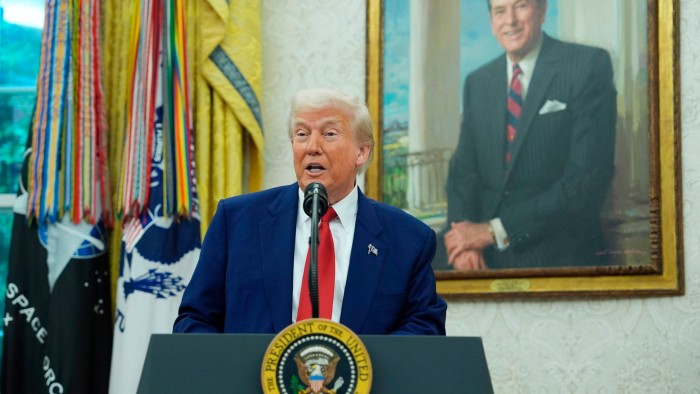Unlock the White House Watch newsletter for free
Your guide to what Trump’s second term means for Washington, business and the world
The Trump administration has told US companies that offer software used to design semiconductors to stop selling their services to Chinese groups, in the latest attempt to make it harder for China to develop advanced chips.
Several people familiar with the move said the US Department of Commerce had told so-called electronic design automation groups — which include Cadence, Synopsys and Siemens EDA — to stop supplying their technology to China.
The Bureau of Industry and Security, the arm of the US commerce department that oversees export controls, issued the directive to the companies via letters, according to the people. It was unclear if every US EDA company had received a letter.
The move marks a significant new effort by the administration to stymie China’s ability to develop leading-edge artificial intelligence chips, as it seeks a technological advantage over its geopolitical rival. In April, Washington restricted the export of Nvidia’s China-specific AI chips.
On its second-quarter earnings call on Wednesday, Synopsys chief executive Sassine Ghazi said: “We are aware of the reporting and speculation, but Synopsys has not received a notice from BIS. So, our guidance that we are reiterating for the full year reflects our current understanding of BIS export restrictions, as well as our expectations for a year-over-year decline in China [revenue].”
An official from the commerce department said it was “reviewing exports of strategic significance to China. In some cases, [the department] has suspended existing export licences or imposed additional licence requirements while the review is pending.”
The directive comes at a delicate time as the US and China try to reach a trade deal after both sides recently agreed in Geneva to pause tit-for-tat tariffs for 90 days.
The Financial Times reported last month that the Trump administration intended to put a number of Chinese chipmakers on a blacklist that would make it extremely difficult for US companies to provide them with American technology. But some officials pushed for a delay to avoid jeopardising the two countries’ trade talks.
Christopher Johnson, a former CIA China analyst, said the new export controls underscored the “innate fragility of the tariff truce reached in Geneva. With both sides wanting to retain and continue demonstrating the potency of their respective chokehold capabilities, the risk the ceasefire could unravel even within the 90-day pause is omnipresent”.
Johnson, who heads China Strategies Group, a risk consultancy, said that China had successfully leveraged its stranglehold on rare earths to bring the US to the negotiating table in Geneva, which “left the Trump administration’s China hawks eager to demonstrate their export control weapons still have purchase”.
While it accounts for a relatively small share of the overall semiconductor industry, EDA software allows chip designers and manufacturers to develop and test the next generation of chips, making it a critical part in the supply chain.
Synopsys, Cadence Design Systems and Siemens EDA — part of Siemens Digital Industries Software, a subsidiary of Germany’s Siemens AG — account for about 80 per cent of China’s EDA market. None of the three companies immediately responded to requests for comment.
In fiscal year 2024, Synopsys reported almost $1bn in China sales, roughly 16 per cent of its revenue. Cadence said China accounted for $550mn or 12 per cent of its revenue.
Synopsys shares fell 9.6 per cent on Wednesday, while those of Cadence lost 10.7 per cent.
In 2022, the Biden administration introduced restrictions on sales of the most sophisticated chip design software to China, but the companies continued to sell export control-compliant products to the country.
In his first term as president, Donald Trump banned China’s Huawei from using American EDA tools. Huawei is seen as an emerging competitor to Nvidia with its “Ascend” AI chips.
Nvidia chief executive Jensen Huang recently warned that successive attempts by American administrations to hamstring China’s AI ecosystem with export controls had failed.
Last year Synopsys entered into an agreement to buy Ansys, a US simulation software company, for $35bn. The deal still requires approval from Chinese regulators. Ansys shares fell 5.3 per cent on Wednesday.
On Wednesday the US Federal Trade Commission announced that both companies would need to divest certain software tools to receive its approval for the deal.
The export restrictions have encouraged Chinese competitors, with three leading EDA companies — Empyrean Technology, Primarius and Semitronix — significantly growing their market share in recent years.
